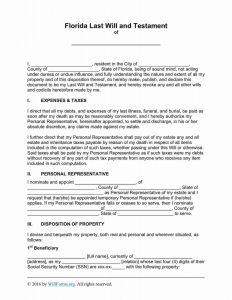Free Florida Last Will and Testament Template
Importance of a Last Will
If you are a family man with children, it is vital to prepare a last will earlier in life. You may have several properties, businesses, and life insurance. While you may think that all is well, death knocks and leaves your family vulnerable to scammers, accruing taxes, or greedy relatives who want to take over your estate. If you write a last will and testament, all of these misfortunes will not occur and your family will continue with life as usual upon your death.
The last will and testament template is vital to all residents who may wish to leave their wealth to loved ones, friends, charity organizations, or any other individual.
You can indicate your underage children’s legal guardian, but you must inform the person before writing the document. It is also possible to create a trust fund for your children or pet using the last will and testament. The document secures your children’s future financially until they are of age.
The last will allows you to appoint a trusted executioner – the person who will carry out all of your last wishes through a power of attorney. It is essential to choose your preferred executioner because the State will appoint a public trustee, which is quite expensive if you don’t.
Sometimes, you may leave outstanding debts or taxes after you pass on. The will has an avenue that permits the executor to pay off all the debts using the estate’s proceeds. However, the document must pass through the probate court before the will is executed.
It is imperative to know that Florida does not permit joint property distribution or a homestead. Another fundamental aspect that a will covers is the list of beneficiaries. You may be a close friend or relative, but if your name is not on the list, you cannot claim any portion of wealth from the testator’s will.
How to Change the Last Will
The Florida State allows testators to amend the last will after completion. Sometimes you may want to remove a beneficiary or include another property that you recently acquired. Whatever the reason, it is permissible as long as you follow the legal procedure known as a codicil.
Amending the will is like creating the original document, only that here you are appending the additional information. Crossing out sentences or adding hand-written details will render the last will document invalid.
Requirements for a Florida Last Will and Testament
According to Florida laws (§732.501), the binding agreement should have detailed information of the testator, two witnesses, beneficiaries, an executor, and a certified legal representative.
The will creator, the testator, must be 18 years and over with a sound mind for the document to be deemed legal. He or she should write the will freely without being pressured or coerced by other parties.
At least two witnesses must sign the document in the presence of a certified notary representative. Florida allows self-proving wills as long as the testator and witnesses append their signatures on a notarized affidavit. The State of Florida only recognizes written wills and holographic or oral wills are invalid.
Finally, the executioner should present the last will in a probate court for verification to allow asset distribution commencement.
Revoking the Last Will
Suppose you want to withdraw your last will and testament. The law permits you to destroy the document voluntarily without any coercion from third parties. You can either burn it or tear it to make it illegible. The testator must revoke the last will or delegate the process to another trusted individual with evidence of the intent.
Other Last Will and Testament Templates
- arizona will form
- california last will and testament
- colorado last will and testament
- georgia will template
- illinois will form
- maryland will template
- michigan will form
- mn last will and testament
- new jersey will form
- new york last will and testament
- nc will template
- ohio last will and testament
- oregon will form
- pa will template
- sc last will and testament
- tennessee will form
- texas last will and testament
- virginia will template
- washington state will template
- wisconsin last will and testament
